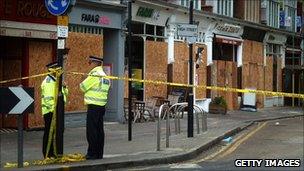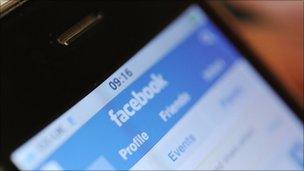Home to a social media crackdown?
- Published
- comments

Boarded up shops and businesses which were attacked in Ealing Green
I've spent the last fortnight deep in rural France, almost entirely removed from the sea of email, mobile phone messages and social media in which I normally swim. But not quite…
At about 0100 last Tuesday I was woken by a ping from my mobile phone. It wasn't online but still receives the very occasional text when someone posts on my Facebook wall. Blearily, I reached for it and read this from a distant acquaintance, who was obviously unaware that I was on holiday:
"be safe Rory, apparently it's mayhem in Ealing...I have never been that scared before ever. It's quiet where I am now around Kingston, but I'm really scared! Be safe."
Mayhem in Ealing, the sleepy suburb where I've lived for more than two decades? Nonsense, I thought, and went back to sleep. But the next morning I thought it best to ring a relative in West London, and the full story came tumbling out.
Over the next few days, the story of the riots swept through the French media. Whenever I go to France, I love to buy the local papers, which give a wonderful pot-pourri of everything from the price of haricots verts to global financial crises.
So, La Depeche du Midi, external, which had been headlining an exceptional local mushroom harvest, started running extensive coverage of "les emeutes de Londres". Even Ealing - "chic et residentiel" apparently - made it into its pages.
Returning home this weekend, I found that amidst all the soul-searching about the causes of the riots there was a technology angle.
Social media, principally Blackberry Messenger (BBM), Facebook and Twitter were being pinpointed as the means used by rioters and looters to organise, and it seemed a crackdown was coming.
Here's what David Cameron told the Commons on Thursday:
"When people are using social media for violence we need to stop them. So we are working with the police, the intelligence services and industry to look at whether it would be right to stop people communicating via these websites and services when we know they are plotting violence, disorder and criminality. I have also asked the police if they need any other new powers. Police were facing a new circumstance where rioters were using the BlackBerry Messenger service, a closed network, to organise riots. We've got to examine that and work out how to get ahead of them."
That social media were used by rioters is both obvious and completely unsurprising - after all they are now so woven into our daily lives that they even merit a mention in Radio 4's cosy rural soap opera The Archers.

A number of people have been arrested on suspicion of using social media to incite disorder
A couple of young Ealing Blackberry users told me they'd received dozens of BBM messages during the riots but mostly warning people where trouble was breaking out rather than encouraging them to participate.
BBM was also used to broadcast lots of inaccurate information - "they said the Army had been called in, that the BBM network was about to be taken down."
And let's not forget that as well as telling looters where to head next, the likes of Twitter were used to organise mass clean-ups and appeals on behalf of the victims.
Even the police are finding these new tools helpful - just look at the Met's Flickr pages with their pictures of suspected rioters, external.
We can argue long and hard about whether social media are a force for good or evil. On one side of the scales, you have Facebook inspiring an Egyptian uprising, on the other it's hosting pro-anorexia material.
What is not clear is what on earth you can or should do to curb or monitor the use of these networks, and whether the government really is bent on a crackdown, as web liberty campaigners fear.
RIM, the company behind Blackberry Messenger, has said it will be happy to take part in talks with the Home Office about the role played by social media in the riots.
But given how sensitive the Canadian firm is about privacy and security on its network - see this clip for evidence, external - I'd be amazed if much comes of that meeting.
After all, if RIM is reluctant to give security agencies in India and the Middle East the keys to its networks, is the company really going to allow the British police greater access - or accede to MPs demands to impose a curfew on BBM during times of trouble?
In any case, after consulting lots of security and telecoms types - via that subversive network known as Twitter - it looks to me as though the law already gives the police some monitoring powers.
The Regulation of Investigatory Powers Act already allows them to get access to BBM messages or other social network material once an order has been issued.
In that way, social media are no different from the phone networks and the post, which can be intercepted if the police can identify suspects in advance.
But to go further and to have live monitoring of random conversations across BBM or Facebook would require new laws, a huge investment in police time, and very active co-operation from the networks themselves.
By the way this week's edition of Click, external provided a great explanation of how BBM works and how practical it might be to or monitor it, and the FT's Tim Bradshaw wrote this interesting blog post, external about the issue of social media blocking.
So here's my prediction. The coming weeks will see plenty of earnest discussions between executives from RIM, Facebook and Twitter and the UK government about co-operation.
There will be passionate blog posts from civil liberties campaigners warning that our internet freedom is as much in danger as in China or North Korea.
Police officers will be encouraged to familiarise themselves with the workings of BBM. But those "new powers" David Cameron talked about for the police to control social media? I don't expect to be reading about them in La Depeche du Midi next year.